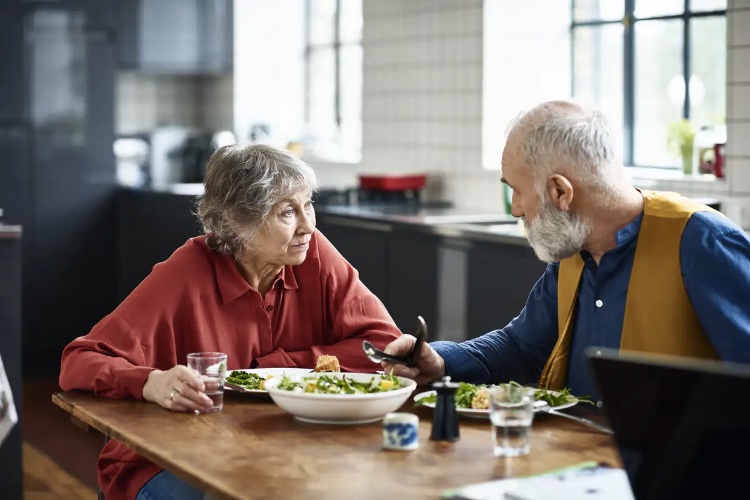COVID-19 has revealed a great many things about our world, including the vulnerabilities inherent in our economic, health care and educational institutions. The pandemic and the resulting orders to shelter in place have also uncovered vulnerabilities in our relationships with others.
Many of us are not just dealing with our own feelings of anxiety, anger and sadness; we are dealing with the anxiety, anger and sadness expressed by the people with whom we live and other loved ones with whom we’ve maintained virtual connections.
How do you respond with empathy and support your partner when you are feeling a host of emotions ourselves?
Is it even possible?
As a clinical psychologist, I have spent the last two decades studying how couples facing chronic stressors can be there for each other in the midst of their own personal suffering. My research and that of my colleagues has shown that it is possible, and even beneficial to oneself, to others and to our relationships if we learn to practice empathy and other skills even when we’re not feeling at peace with the world. Considering that we will not be required to shelter in place forever, it makes sense to put in the effort now to preserve and promote healthy relationships that will last far beyond the time of COVID-19.
Empathy for your partner is especially critical during this crisis.Getty Images/Bob Thomas
Sharing emotions is good, but listening is also required
Expressing our emotions to loved ones is a natural response to feeling stressed. In fact, we share our feelings with others for a number of reasons: to bond with others, to be comforted or to seek advice. Sharing our feelings with others can help us get a handle on our emotions.
But it’s not just the act of disclosing emotions that helps us feel better. Having a listening partner who is emotionally responsive and “gets it” is key.
It’s difficult to really be there for someone when we are feeling stressed out ourselves. In fact, listening to our loved one’s suffering can adversely affect our well-being. My colleagues and I have found that couples in which one or both partners experience chronic pain report feelings of isolation, helplessness and resentment in their relationships that affected their emotional and relationship well-being.
Even when both partners have chronic pain, they may experience it differently and have different coping strategies and emotions surrounding an uncertain future with a chronic illness. Yet, couples found that building what we psychologists call relational flexibility skills supported their quality of life and their relationships.

Practicing a new set of skills
The ability to share feelings with a partner and listen to a partner’s feelings in a nonjudgmental manner that respects both partner’s values is something that we therapist calls relational flexibility. Our research has shown that there are several ways to cultivate relational flexibility skills.
- Reconnect with your values: We can get caught up in the moment and forget what is really important. Therapies like acceptance and commitment therapy and spiritual practices can support realign our actions with our personal values so that external worries, time pressure or other factors do not drive our behavior. Imagining what we want people to say at our retirement, birthday or anniversary party or even at our funeral can bring your values into stark focus.
- Be curious: Stop and consider how we would want our listening partner to react if we were sharing these same feelings. And consider why they may be feeling the way they do. What might they need right now? You might be surprised to learn that your partner may not always want you to problem-solve when they are upset. Often, they already know what to do but are seeking emotional support instead. Match your response to what they want. When in doubt, ask.
- Validate: Emotional validation, a key part of therapies such as dialectical behaviour therapy, is a powerful signal that you accept someone for who they are. We can express emotional validation by paying attention to them, acknowledging that what they feel is real, reflecting back what we have heard them say, expressing our sorrow or anger about what they’ve experienced, and asking questions about what you can do to support them.
- Pay attention to the present moment: It can be hard to hear about a loved one’s suffering. Sometimes we disengage, become distracted, jump into problem-solving mode, or change the subject because it’s distressing to listen to a partner’s distress. With practice, you can monitor, become aware of, and accept your own feelings even as you calmly listen to another. We adapted meditations from mindfulness practitioners and researchers including Jon Kabat-Zinn, Thich Nhat Hanh in our couples interventions and there are many more available on the web.
- Spend time with your loved ones in valued activities: This is a staple of couple therapies such as integrative behavioural couple therapy and may seem like a common-sense solution. But spending quality time with loved ones is more difficult when our attention is split between working from home, homeschooling and caregiving, managing a variety of pandemic-related stressors, and leisure activities. Recall your values and make appointments in your calendars for mutually valued activities. The positive feelings that come from these activities will sustain you both.

Limits to listening
To be sure, we have our limits when listening to another person’s pain. Even our most tolerant and loving partners may not be able to respond the way we hope. This might be because they need to decompress. In this case, it may be wise to seek out others who share your situation or circumstances for peer support. And if you are the listener, and you feel overwhelmed by another’s pain, it’s important to take care of yourself and let them know that you are not able to give them what they need. And if you or your loved one discloses that they are feeling so down that they are thinking of harming themselves, it’s time to seek emergency support.
For those of us sharing the good, the bad and the ugly with loved ones during this pandemic, let’s recognise that we have much to be grateful for our relationships, however socially distant we have to be right now. This time of great stress will eventually pass and we will be out and about again. Practice relational flexibility to ensure that you and your loved ones will enjoy that happy day together.
[You need to understand the coronavirus pandemic, and we can help. Read The Conversation’s newsletter.]![]()
Annmarie Caño, Professor of Psychology and Associate Provost for Faculty Development and Faculty Success, Wayne State University
This article is republished from The Conversation under a Creative Commons license. Read the original article.
Are you still being able to support your partner during this stressful time? Tell us in the comments below.




















1:05 pm
9:02 am
10:03 am
4:19 am
3:40 pm
11:49 am
11:24 am
4:15 pm
-

-
-
Ellen replied
- 03 May 2020 , 3:32 am

Reply10:28 am
2:47 am
10:52 pm
8:58 pm
5:57 pm
3:54 pm
-

-
-
Ellen replied
- 03 May 2020 , 3:43 am

Reply1:55 pm
9:37 pm
9:01 pm
3:55 pm
-

-
-
mom93821 replied
- 30 Apr 2020 , 6:54 am
Reply1:53 pm
1:01 pm
-

-
-
Ellen replied
- 30 Apr 2020 , 3:36 am

Reply- 1
- 2
- 3
- »
Post a commentTo post a review/comment please join us or login so we can allocate your points.